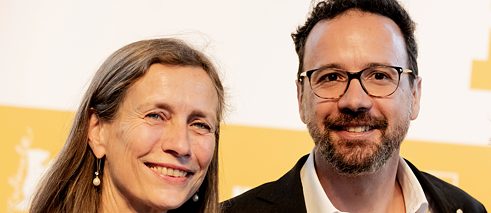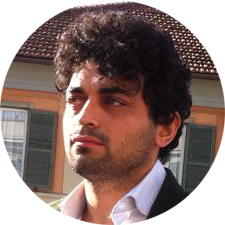Berlinale Bloggers reply
What should be different in 2020?

Changeover time at the Berlinale! In 2020, Dieter Kosslick, festival director for many years, will be succeeded by a new team: Carlo Chatrian and Mariette Rissenbeek. What should be different at the next Berlinale?
 Foto: © Privat
Philipp Bühler - Germany: Over the years the Swabian joker has turned the festival - in utter self-denial? - into a space for masochists. Formats such as the "Culinary Cinema" or the cute homage to the stars who had arrived served as compensation. I wish the new team a better balance between relevant themes and aesthetic quality. In short: a little more taste in the selection. In Locarno, Carlo Chatrian is said to have pulled this off quite well.
Foto: © Privat
Philipp Bühler - Germany: Over the years the Swabian joker has turned the festival - in utter self-denial? - into a space for masochists. Formats such as the "Culinary Cinema" or the cute homage to the stars who had arrived served as compensation. I wish the new team a better balance between relevant themes and aesthetic quality. In short: a little more taste in the selection. In Locarno, Carlo Chatrian is said to have pulled this off quite well.
Sarah Ward - Australia: The Berlinale competition might be the star of the show; however, in recent years, the Forum and Panorama lineups have delivered films that intrigue, excite, provoke and challenge beyond the often safer choices in the festival’s higher-profile program. It would be fantastic to see the competition take more cues from its counterparts, and take more risks. The term “a competition film” has become shorthand for the type of main contenders typically seen at the Berlinale, and that shouldn’t be the case.
Egor Moskvitin - Russia: I want the festival to stay as it is - as unpredictable as possible. When critics go to Venice and Toronto, they know that they have to expect a parade of films for intellectual audiences, a kind of repetition of the "Oscars". At Sundance, they know that simple stories larded with humanism await them. And when they finally leave for Cannes, they're prepared for someone to create the film of the year for them. Only Berlin remains a surprise. Here every spectator is you, every spectator is a programme director.
 Foto: © Privat
Camila Gonzatto - Brazil: It would be nice if the new leadership would consider strategies to expand the presence and involvement of the local audience, either with more performances or with an expansion of the programme. The entrance fees should also be reconsidered to make the festival more affordable. After all, filmmakers greatly desire that their films be seen by as many people as possible.
Foto: © Privat
Camila Gonzatto - Brazil: It would be nice if the new leadership would consider strategies to expand the presence and involvement of the local audience, either with more performances or with an expansion of the programme. The entrance fees should also be reconsidered to make the festival more affordable. After all, filmmakers greatly desire that their films be seen by as many people as possible.
 Foto: © Privat
Joseph Walsh - United Kingdom: Dieter Kosslick’s tenure saw the festival grow and focusing more and more on drawing in a public audience– something that other A-list festivals could learn from. Kosslick's egalitarian approach is something that I’ve always admired, and for me, it is a priority that the festival remains public facing. There has been a lot of discussion among critics and journalists that next year the festival will move to the end of February and into March, putting it after the Academy Awards and the BAFTAs. This can only be seen as a good thing, as it not only removes the pressure of the awards season, but it also gives Berlin greater distance from Sundance. This is perhaps a chance for radical change. I would argue that the Berlinale should view itself as the start of the film year. This gives the new incoming director, Carlo Chatrian, the opportunity to bold reshape the festival.
Foto: © Privat
Joseph Walsh - United Kingdom: Dieter Kosslick’s tenure saw the festival grow and focusing more and more on drawing in a public audience– something that other A-list festivals could learn from. Kosslick's egalitarian approach is something that I’ve always admired, and for me, it is a priority that the festival remains public facing. There has been a lot of discussion among critics and journalists that next year the festival will move to the end of February and into March, putting it after the Academy Awards and the BAFTAs. This can only be seen as a good thing, as it not only removes the pressure of the awards season, but it also gives Berlin greater distance from Sundance. This is perhaps a chance for radical change. I would argue that the Berlinale should view itself as the start of the film year. This gives the new incoming director, Carlo Chatrian, the opportunity to bold reshape the festival.
Alva Gehrmann - Norway: In any case, the Berlinale should continue to be a festival for the general public, because that is what distinguishes it from the festivals in Cannes and Venice. With the constant expansion of the programme, even more viewers will be able to see exceptional films in the cinema. However, it has become confusing due to the many different sections. That's why I'd like to see a reduced selection and show the audience these films more than two or three times.
Gerasimos Bekas - Greece: I don't think the change will be so noticeable next year. There will probably be more stars to guarantee international attention. There will be more women in positions of responsibility and hopefully more good films. I hope the new management will take the liberty of experimenting and I am curious to see what comes of it.
Noha Abdelrassoul - Egypt: It was my first time at the Berlinale and it was great to see that the staff was always helpful. The cinemas are a bit scattered around in Berlin which doesn’t make things easy for journalists, but of course it’s understandable because this way we get to see different parts of Berlin. It would be good if interview rooms could be made available not only until 6 pm, but even longer.
Jutta Brendemühl - Canada: The right mix of risk-taking and quality management. And (even) more cinema from Asia, where some of the most exciting films are coming from right now.
Andrea D'Addio - Italy: The Berlinale is the international film festival with the world' s largest audience. The average quality of the films, however, does not reflect this, and so only a few films from the competition find favour with audiences and film critics. I hope that the new management team can improve this aspect of an otherwise almost perfect festival.
Man Jung Ma - Taiwan: Over many years, the Berlinale has not been afraid of the spirit on political issues, providing freedom of artistic, and becoming a major feature of the Berlin Film Festival. The next management member, Carlo Chatrian, who used to be the president of the Locarno Film Festival, also brought a unique aesthetic taste to Locarno and even more focused on the new cinema in the third world. I believe that the future in Berlinale will not only improve the quality of film selection, but also focus on new directors with their great potential.







